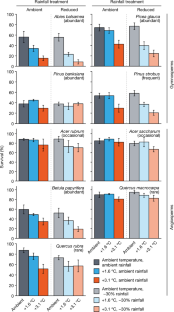カナダやシベリア、アラスカにある北方林は、地球の温度調節に役立っています。 Boreal forests like the ones found in Canada, Siberia and Alaska help regulate the Earth’s temperature.
2022-08-11 ミシガン大学
ミシガン北部、カナダ中部、ミネソタ北部の森林に生息する主な樹種が、将来の気候下でどのような状態になるかをテストしました。そして、ヒートランプと埋設ケーブルを使って土壌を暖め、屋外で密閉された環境下でテストを行いました。そのため、基本的には非常に現実的な実験を5年間行い、近くの対照区に植えた苗と比べて、成長が早いか遅いか、死亡率が高いか低いかといった点を調べました。その結果、北方林で最も豊富な2つの種、トウヒとモミは、適度な温暖化でも非常に悪く、より速く、より多く枯れ、よりゆっくり成長することがわかりました。
<関連情報>
- https://wdet.org/2022/08/11/climate-change-is-altering-boreal-forests-but-its-not-too-late-researcher-says/
- https://www.nature.com/articles/s41586-022-05076-3
緩やかな気候変動でも、北方林の森林は大きく変化する可能性がある Even modest climate change may lead to major transitions in boreal forests
Peter B. Reich,Raimundo Bermudez,Rebecca A. Montgomery,Roy L. Rich,Karen E. Rice,Sarah E. Hobbie & Artur Stefanski
Nature Published:10 August 2022
DOI:https://doi.org/10.1038/s41586-022-05076-3

Abstract
The sensitivity of forests to near-term warming and associated precipitation shifts remains uncertain1,2,3,4,5,6,7,8,9. Herein, using a 5-year open-air experiment in southern boreal forest, we show divergent responses to modest climate alteration among juveniles of nine co-occurring North American tree species. Warming alone (+1.6 °C or +3.1 °C above ambient temperature) or combined with reduced rainfall increased the juvenile mortality of all species, especially boreal conifers. Species differed in growth responses to warming, ranging from enhanced growth in Acer rubrum and Acer saccharum to severe growth reductions in Abies balsamea, Picea glauca and Pinus strobus. Moreover, treatment-induced changes in both photosynthesis and growth help explain treatment-driven changes in survival. Treatments in which species experienced conditions warmer or drier than at their range margins resulted in the most adverse impacts on growth and survival. Species abundant in southern boreal forests had the largest reductions in growth and survival due to climate manipulations. By contrast, temperate species that experienced little mortality and substantial growth enhancement in response to warming are rare throughout southern boreal forest and unlikely to rapidly expand their density and distribution. Therefore, projected climate change will probably cause regeneration failure of currently dominant southern boreal species and, coupled with their slow replacement by temperate species, lead to tree regeneration shortfalls with potential adverse impacts on the health, diversity and ecosystem services of regional forests.



